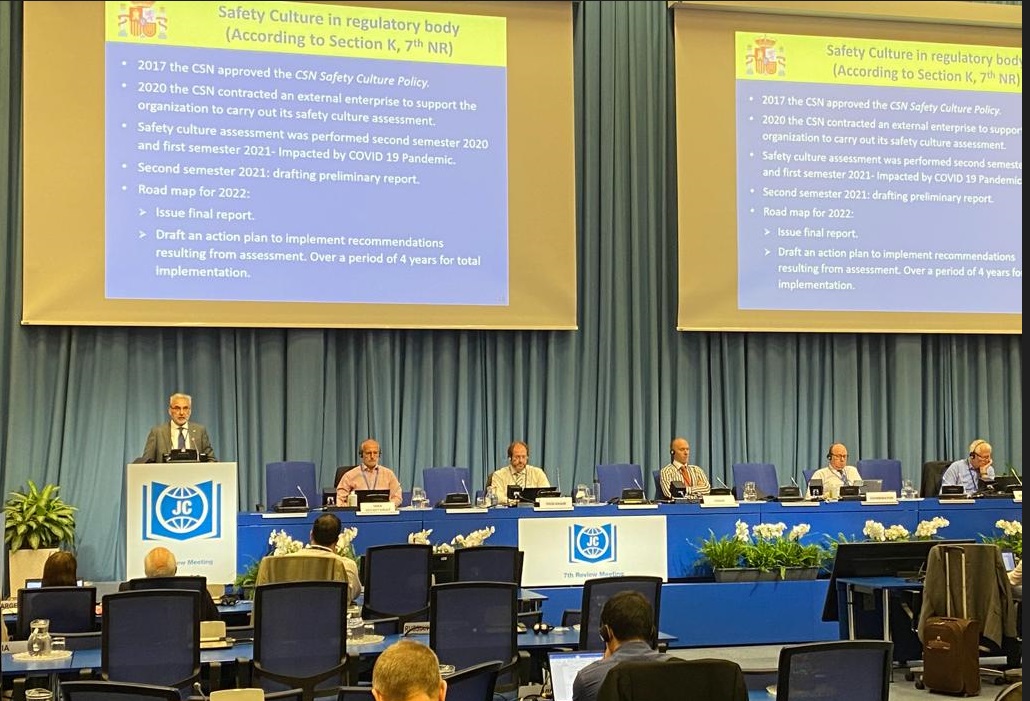Contenido principal
2022
The CSN attends the 7th Review Meeting of the Joint Convention on the Safety of Spent Fuel Management and on the Safety of Radioactive Waste Management

The Spanish Nuclear Safety Council (CSN) participates in the seventh meeting of the Joint Convention on the Safety of Spent Fuel Management and on the Safety of Radioactive Waste Management, which is being held at the headquarters of the International Atomic Energy Agency (IAEA) in Vienna from June 27 to July 8.
The Joint Convention on the Safety of Spent Fuel Management and on the Safety of Radioactive Waste Management is structured into eight working groups with between eight and eleven countries each. In them, the members share their management strategies and lessons learned. These meetings are very useful for the participating institutions given the composition of the groups in which regulators who have a long history in waste management policies are combined with others with less implementation.
Commissioner Francisco Castejón chaired the sessions of one of these groups, being the first time that a Spaniard holds this position in the joint Convention. Castejón leads group 7, which includes Ukraine, Brazil, Cuba, Eritrea, Germany, Mauritania, Morocco, the Netherlands, Serbia, Syria, and Uruguay.
Spain national report
The presentation of the seventh national report of Spain to the IAEA has been coordinated by the Ministry for the Ecological Transition and the Demographic Challenge (MITERD, by its Spanish acronym), with the participation of the CSN and ENRESA. The document shows the capacities and efforts developed to respond to the challenges which involves the management of spent nuclear fuel and radioactive waste from, among others, nuclear power plants, nuclear fuel manufacturing facility, disposal facility or radioactive facilities. The approval process of the 7th General Plan for Radioactive Waste has occupied a predominant place in the Spanish report, in which the options contemplated for the management of high-level waste are specified, as well as the supervision of the management of the safety of low, medium and high level waste by the CSN. The presentation concluded with a summary of the actions carried out in the regulatory body and in ENRESA due to the COVID-19 pandemic.
The Spanish delegation has been headed by the permanent representative ambassador in Vienna, Esther Monterrubio Villar and José Manuel Redondo, deputy general director of Nuclear Energy of the MITERD. The CSN was represented by the President of the regulator, Juan Carlos Lentijo; Commissioners Pilar Lucio and Francisco Castejón; the Secretary General, Pablo Martín, and the acting technical directors of Nuclear Safety and Radiation Protection, Teresa Vázquez and Javier Zarzuela.
The Joint Convention is the first legal instrument in which the issue of safety in the management of spent fuel and radioactive waste is addressed on a global scale, for which it establishes fundamental safety principles and creates a process of "peer review" similar to the one of the Convention on Nuclear Safety. It was approved in 1997 and entered into force on June 18, 2001 with the aim of permanently improving safety in the management of spent fuel and radioactive waste. The institutions that have signed and ratified the Convention (88 countries) meet every three years.
Meeting with the IAEA Director General
The Spanish delegation, in the context of the Convention, held a meeting with the Director General of the IAEA, Rafael Grossi, with whom they discussed issues such as Spain's commitment to the Joint Convention, its support for the IAEA's actions in Ukraine or the implementation in value of joint work with other institutions.
In addition, on behalf of the CSN, the IRRS-ARTEMIS mission was highlighted as an aid for improving safety management. In the same way, the Equality Plan in which the regulatory body is working was highlighted and special mention was made of the work that the IAEA has developed under the mandate of Grossi for the promotion of scientific and technical women.
In another order of things, the president of the CSN expressly thanked the IAEA Director General for attending the event to celebrate the 25th anniversary of the Ibero-American Forum of Radiological and Nuclear Regulatory Bodies (FORO) that will take place in Madrid next July. On his part, Grossi wished to recognize Spain for his work in nuclear safety and took the opportunity to recall that the Spanish nuclear sector is one of the best in the world.
Isabel la Católica Order
During his visit to Vienna, the president of the CSN was awarded the Real Orden de Isabel la Católica by the permanent representative ambassador in Vienna, Esther Monterrubio. During the ceremony, which took place at the ambassador's residence in the Austrian capital, Lentijo thanked the institutions for the distinction and alluded to the importance of teamwork, both at the IAEA and at the CSN, without which, recognized, success wouldn´t have been possible.
The Real Orden de Isabel la Católica was instituted by King Ferdinand VII on March 14, 1815, under the name of Royal American Order of Isabel la Católica. Currently, it is governed by Royal Decree 2395/1998, of November 6, which approves the Regulations of the Order of Isabel la Católica, and aims to "reward those extraordinary behaviors of a civil nature that benefit the Nation or that contribute, in a relevant way, to favor the relations of friendship and cooperation of the Spanish Nation with the rest of the International Community”.
*Check here to check the glossary of technical terms*
